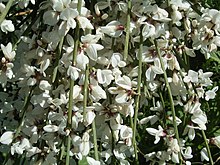| Retama | |
|---|---|

| |
| White flowers of Retama rhodorhizoides | |
| Scientific classification | |
| Kingdom: | Plantae |
| Clade: | Tracheophytes |
| Clade: | Angiosperms |
| Clade: | Eudicots |
| Clade: | Rosids |
| Order: | Fabales |
| Family: | Fabaceae |
| Subfamily: | Faboideae |
| Clade: | Core Genistoids |
| Tribe: | Genisteae |
| Genus: | Retama Raf. |
| Species | |
|
4–14; see text. | |
| Synonyms[1] | |
| |
Retama (also known as rotem, Hebrew: רותם) is a genus of flowering bushes in the legume family, Fabaceae. It belongs to the broom tribe, Genisteae.[2] Retama broom bushes are found natively in North Africa, the Levant and some parts of southern Europe. Retama raetam and Retama monosperma have white flowers, while Retama sphaerocarpa has yellow flowers. It remains an open question in taxonomy whether the members of the genus Retama should be incorporated into the genus Genista (see Genisteae).
The species contain cytisine, a toxic alkaloid.
In the Spanish language the name retama is commonly used for broom bushes in general, including the genus Retama.
Taxonomy
[edit]The genus Retama was erected in 1838 by Constantine Samuel Rafinesque, the genus name being derived from the Arabic name. Rafinesque noted that the genus had been included in other genera, including Spartium, Cytisus and Genista, but he regarded it as distinct.[3]
The name Lygos was once used for Retama;[4][5][6] it is now a rejected name (nomen rejiciendum) in the International Code of Nomenclature for algae, fungi, and plants.[7] Michel Adanson described and classified the genus referencing to the Greek plant "lygos" and to Pedanius Dioscorides.[8] In the ancient Greek language, lygos (λύγος) was the name of the plant Vitex agnus-castus (chaste tree)[9] or willow or other plants with pliant twigs.[10] The same word (in some cases Latinized as Lygus) was used in botany and zoology for various taxonomic groups as a component of names, e.g. Lygodysodea, Lygisyum, Lygistum, Lygodesmia etc.[11][12]
Retama is traditionally placed in the tribe Genisteae, and in the subfamily Papilionoideae in the 2017 classification of the family Fabaceae (Leguminosae).
Species
[edit]The number of species in the genus and their circumscription varies. As of September 2023[update], Plants of the World Online, based on the African Plant Database, accepted the following species:[1]
- Retama dasycarpa Coss.
- Retama monosperma (L.) Boiss.
- Retama raetam (Forssk.) Webb & Berthel.
- Retama rhodorhizoides (Webb & Berthel.) Webb & Berthel.
- Retama sphaerocarpa (L.) Boiss.
R. rhodorhizoides is included in R. monosperma by some sources,[13] and has been identified as R. raetam by others.[14] When recognized as a separate species, it is restricted to the Canary Islands.[15]
Cultural significance
[edit]Retama may be mentioned in the Bible, in I Kings 19:4, Psalms 120:4, and Job 30:4, under the name rotem (Heb. רוֹתֶם/רֹתֶם). According to multiple Jewish biblical commentators, Retama is used in the Bible as a symbol of slander, as, when burnt, its embers will remain hot long after they turn black.[16][17] However, this translation is contested, with other commentators translating the word as "juniper".[18][16][19]
References
[edit]- ^ a b "Retama Raf.", Plants of the World Online, Royal Botanic Gardens, Kew, retrieved 17 September 2023
- ^ Cardoso D, Pennington RT, de Queiroz LP, Boatwright JS, Van Wyk BE, Wojciechowski MF, Lavin M (2013). "Reconstructing the deep-branching relationships of the papilionoid legumes". S Afr J Bot. 89: 58–75. doi:10.1016/j.sajb.2013.05.001. hdl:10566/3193.
- ^ Rafinesque, Constantine Samuel (1838), "82. Retama", Sylva Telluriana, Philadelphia, p. 22, retrieved 2018-02-15
- ^ James Cullen, Sabina G. Knees, The European Garden Flora Flowering Plants: Manual for the Identification of Plants Cultivated in Europe, Both Out-Of-Doors and Under Glass, Cambridge University Press, 2011, p. 410.
- ^ European Environment Agency, Thermo-mediterranean (Lygos raetam) brush
- ^ Hanelt P. & Institute of Plant Genetics and Crop Plant Research (eds.), Mansfeld's Encyclopedia of Agricultural and Horticultural Crops, Springer Verlag, Germany, 2001, p. 924
- ^ "Lygos Adans.", Germplasm Resources Information Network, Agricultural Research Service, United States Department of Agriculture, retrieved 2018-02-13
- ^ Adanson M. (1763) Familles des Plantes, Paris, vol. 2, pp. 321, 573. Note: In p. 573 the name is printed as “Lugos”.
- ^ Henry George Liddell, Robert Scott, A Greek-English Lexicon
- ^ Composition of scientific words: a manual of methods and a lexicon of materials for the practice of logotechnics, Brown, Roland Wilbur, Smithsonian Institution Press, 1979 p. 856.
- ^ George Don, A general history of the Dichlamydeous plants, London, 1834, vol. 3, p. 483, 560.
- ^ Brown, p. 485: Lygus oblineatus (bug).
- ^ "Retama monosperma (L.) Boiss.", The Plant List, retrieved 2018-02-15
- ^ "Retama raetam auct". African Plant Database. Conservatoire et Jardin botaniques & South African National Biodiversity Institute. Retrieved 2018-02-15.
- ^ "Retama rhodorhizoides Webb & Berthel.", Plants of the World Online, Royal Botanic Gardens, Kew, retrieved 2018-02-15
- ^ a b Redak. pp. I Kings 19:4 "Under one rotem".
- ^ Metzudat David. pp. Psalms 120:4 "With hot coals of rotem".
- ^ Rashi. pp. I Kings 19:4 "Rotem".
- ^ Ralbag. pp. I Kings 19:4 "And he sat under one rotem".









